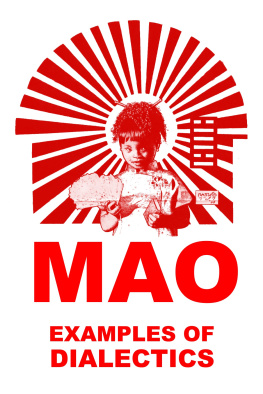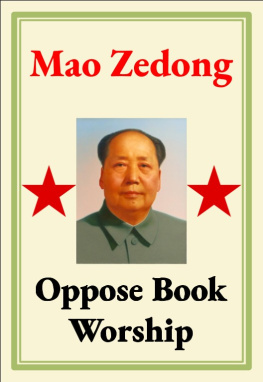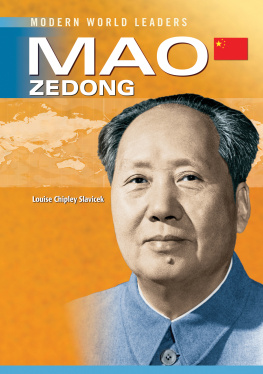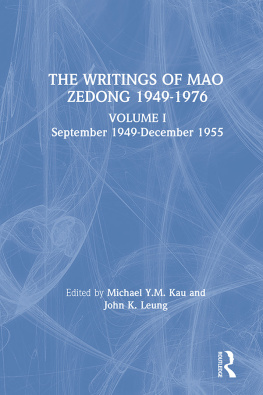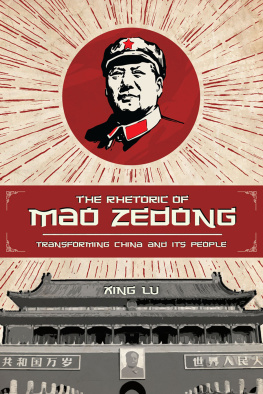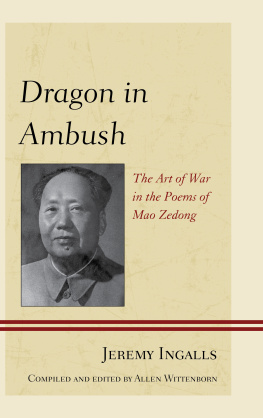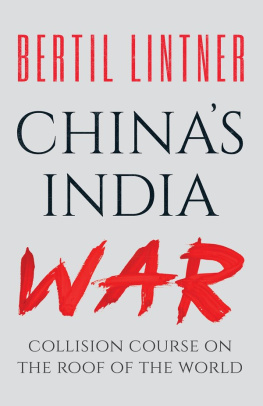Mao Zedong - Examples Of Dialectics
Here you can read online Mao Zedong - Examples Of Dialectics full text of the book (entire story) in english for free. Download pdf and epub, get meaning, cover and reviews about this ebook. year: 2018, publisher: Marxist Internet Archive, genre: Politics. Description of the work, (preface) as well as reviews are available. Best literature library LitArk.com created for fans of good reading and offers a wide selection of genres:
Romance novel
Science fiction
Adventure
Detective
Science
History
Home and family
Prose
Art
Politics
Computer
Non-fiction
Religion
Business
Children
Humor
Choose a favorite category and find really read worthwhile books. Enjoy immersion in the world of imagination, feel the emotions of the characters or learn something new for yourself, make an fascinating discovery.
- Book:Examples Of Dialectics
- Author:
- Publisher:Marxist Internet Archive
- Genre:
- Year:2018
- Rating:4 / 5
- Favourites:Add to favourites
- Your mark:
- 80
- 1
- 2
- 3
- 4
- 5
Examples Of Dialectics: summary, description and annotation
We offer to read an annotation, description, summary or preface (depends on what the author of the book "Examples Of Dialectics" wrote himself). If you haven't found the necessary information about the book — write in the comments, we will try to find it.
Examples Of Dialectics — read online for free the complete book (whole text) full work
Below is the text of the book, divided by pages. System saving the place of the last page read, allows you to conveniently read the book "Examples Of Dialectics" online for free, without having to search again every time where you left off. Put a bookmark, and you can go to the page where you finished reading at any time.
Font size:
Interval:
Bookmark:
By Mao Zedong, 1959.
Source: Long Live Mao Zedong Thought, a Red Guard Publication.
Transcription by the Maoist Documentation Project. HTML revised 2004 by Marxists.org. EPUB by Jack Willis, 2018.
This work is licensed under a Creative Commons Attribution-ShareAlike 4.0 International License.
To understand analysis is to understand dialectics. Lenin said dialectics could be summed up as the doctrine of the unity of opposites. Such being the case, the core of dialectics can be grasped immediately. But it is necessary to explain and develop this doctrine. The unity of opposites is conditional, temporary, transitional, relative and mutually exclusive. On the other hand, the struggle of opposites is absolute, just as development and movement are absolute. Therefore, balance is temporary and can be disrupted and it is our responsibility to acquire balance more steadily with each passing day. As far as a person of ability is concerned, it does not depend upon whether or not he could have prevented the Hungarian and Polish incidents from arising, but upon whether or not after the incidents had arisen he had the ways and means to resolve the problems.
The integration of the universal truth of MarxismLeninism and the specific practice of China is materialism. Both are the unity of opposites, which is dialectics. Why insist on arguing? It is simply to avoid discussing dialectics. The Soviet Union has its own way of doing things. The Soviet experiences are one side and Chinas practice is also one side. This is the unity of opposites. The Soviet Union should pick the good ones from among its experiences and follow them, pick the bad ones and discard them. To isolate the Soviet experiences and not integrate them with the Chinese practice is not to pick the good experiences and follow them. If one publishes a newspaper and argues in the same way as Pravda, which is not analytical, he will be like a 3-year-old child, which needs support everywhere, inasmuch as it has lost its independent thinking. In everything, it is necessary to present two methods for comparison. This is dialectics. Otherwise, it will be metaphysics.
Dialectics is to study the main trend and the side issues, the essence and the outward appearance. In contradictions there are principal contradictions and secondary contradictions. In the past, such errors as anti-venturesome advance arose because we did not grasp the principal contradictions and the essence and tried to solve the secondary contradictions as principal contradictions and because we took the side issues as the main trend and did not grasp the essence. The State Council and the Political Bureau of the Central Committee held meetings and solved many isolated questions, but they did not grasp the essential questions. At this meeting we brought up many questions from the past for consultation and resolution.
Marxism tells us that to examine a question, it is necessary to consider the essence, the main trend and the line. This is to see whether or not he builds socialism at home, opposes imperialism internationally and works for internationalism within the socialist camp. These three items constitute a line. As members of the Chinese Communist Party, we also are a party, which opposes imperialism and is for socialism and internationalism. So are the Soviet Union and the other socialist countries. These aspects manifest the essence of the Marxist-Leninist line. We can make a comparison to see if they are steadfast or not. Take Tito. Is he steadfast? It seems to me that all three items are Lacking in the things that he does. He does not want any part of anti-imperialism. He is always talking about how good American imperialism is and how bad the Soviet Union is.
All provinces, municipalities and autonomous regions should call meetings once every two months to review and sum up their work. They should call small meetings of several persons or a dozen or so persons. In the coordination and cooperation aspect they also can hold a meeting every two or three months. Many changes can occur in a movement and it is all the more necessary to exchange information. The meetings are for the purpose of harmonizing the rhythm of production. Work and production should have rhythm. One wave comes in as another crests. This is the unity of the opposites of high speed and low speed. Wave-like advances under the General Line of going all out, aiming high and achieving greater, faster, better and more economical results is the unity of the opposites of high speed and low speed, as well as the unity of opposites of labor and rest. If there are high speed and labor only, it will be one-sided. If it is labor alone and no rest, then how can it be! In doing anything there has to be a period of high speed and a period of low speed. In fighting a war in the past, there had to be periods of consolidation, replenishment and rest between two campaigns. It would be impossible to fight one campaign after another. In fighting a war there also has to be a tempo. The Central Soviet Area was 100 percent Bolshevized. It objected to consolidation and advocated resoluteness, fearlessness, firmness and daringness, pressing forward in victory and making a direct attack on Nan-Chang meant when she said: Though awnings were put up for a thousand li, there never was a permanent feast. Lin Tai-yu was deeply moved when the feast ended and the guests dispersed. This was metaphysics. It was from ignorance of the objective laws that when there is a gathering there must be separation. Wang Hsi-fang did not try to seek the favor of Lin, but she said: Though awnings were put up for a thousand li, there never was a permanent feast. Nevertheless, that was dialectics. This is the truth. It cannot be decided by man. It should be decided by whether it is the truth or not. After a meeting is closed, problems pile up and transform into opening a meeting. After unity has been implemented for a while, there will be a difference in opinion and it will transform into a struggle. When differences arise, disunity begins anew. It is not possible to have unity every day or every year. When unity is talked about, then there must be disunity. Disunity is unconditional. Sometimes there still is no unity even when unity is talked about. Therefore, it is necessary to do something in order to attain unity. To talk all the time about unity, and never about struggle, is not Marxism. Unity must go through struggle before unity can be attained. This is the same within the ranks of the party, class or people. Unity transforms into struggle and again into unity. One cannot talk about unity alone without talking about struggles and contradictions. The Soviet Uni! on does not talk about contradictions between the leadership and the led. Without contradictions and struggles, there will be no world, no development; no life, no anything. To talk all the time about unity can be likened to a pool of stagnant water. It is dreary. We must break down the old basis of unity, go through struggle and attain unity on a new basis. Which is better, a pool of stagnant water or the endless flow of the streaming waters of the Yangtze River? The party is this way and so are the people and the class. Unity-struggle-unity. Then there will be work to do. Production transforms into consumption and consumption transforms into production. Production is for the sake of consumption. Producers are not merely for the sake of other workers, but they themselves are also consumers. Marx said that production implies consumption. Production and consumption and construction and destruction are the unity of opposites and mutually transformable. The production of the whole country is for the sake of consumption and the renovation of equipment and installations over a few decades. Seeding turns into harvesting and harvesting turns into seeding. Seeding is to use up seeds. After seeds are sown, they will grow into seedlings. If no seeds are sown, there will be no seedlings. After harvesting, new seeds are sown. Life and death are also mutually transformable. Life transforms into death and lifeless things transform into living things. I maintain that henceforth celebrations be held for people who passed away at over 50 years of age. This is because people inevitably will die. It is a natural law. Grains are annual plants. Every year they live once and die once. Moreover, the more they die, the more they grow. If pigs are not slaughtered, they will become fewer and fewer. Who is going to feed them? The Soviet Unions Concise Dictionary of Philosophy takes upon itself to differ with me. It says that the transformation of life and death is metaphysical and that the transformation of war and peace is erroneous. Who is right after all? Please ask if living things are not transformed from lifeless-things, whence do they come? The earth is composed of inorganic matters and organic matters. All living organisms are converted from nitrogen, hydrogen and 10 other elements. Living things invariably are transformed from lifeless things. Sons transform into fathers and fathers transform into sons. Females transform into males and males transform into females. Direct transformation is not possible. But after marriage when sons and daughters are begotten, is that not transformation? The mutual transformation of the oppressed and the oppressor refers to the relationship between landlords and capitalists on the one side and workers and peasants on the other. Of course, by oppressor we mean the ruling class, not the people. We are talking about class dictatorship and not about individual oppressors. War transforms into peace, and peace transforms into war. Peace is the opposite of war. When there is no war, it is peace. When hostilities break out at the 38th Parallel, it is war. Once war stops, it is peace again. Military affairs are a special kind of politics. War is an extension of politics. Politics is also a kind of war. At any rate, quantity transforms into quality and quality transforms into quantity. Dogmatism is intense in Europe. Since the Soviet Union has some shortcomings, transformation is absolutely necessary. Likewise, if we do not make good, we also will transform. If at that time our industry becomes the first in the world, we will possibly be cocky and become rigid in our thinking. Infinite transforms into finite, and finite transforms into infinite. Ancient dialectics transforms into medieval metaphysics and medieval metaphysics transforms into modern dialectics. The universe is transformable. So is society. Capitalism transforms into socialism and then communism. Communism also will transform itself. It also has a beginning and an end. To be sure, it will be divided into stages. Perhaps it will be given another name. It will not be fixed. If there is quantitative change only and no qualitative change, it will act contrarily to dialectics. There is nothing in this world that does not go through emergence, development and extinction. Ape changed into man and man emerged. The ultimate outcome of mankind as a whole is extinction. Man will possibly change into another kind of thing. By then the earth will no longer exist. The sun will have cooled. Even now the heat of the sun has cooled considerably, as compared with ancient times. In the glacial period, changes occurred every 12 million years. When the glaciers came, living things died in great numbers. Under the South Pole there are deposits of coal. Thus it can be seen that it was very hot there in ancient times. In Yen-chang County, fossils were dug out bearing traces of bamboo of the Sung Dynasty. In ancient times, bamboo was grown in Yen-chang. Now it wont grow there.
Font size:
Interval:
Bookmark:
Similar books «Examples Of Dialectics»
Look at similar books to Examples Of Dialectics. We have selected literature similar in name and meaning in the hope of providing readers with more options to find new, interesting, not yet read works.
Discussion, reviews of the book Examples Of Dialectics and just readers' own opinions. Leave your comments, write what you think about the work, its meaning or the main characters. Specify what exactly you liked and what you didn't like, and why you think so.

